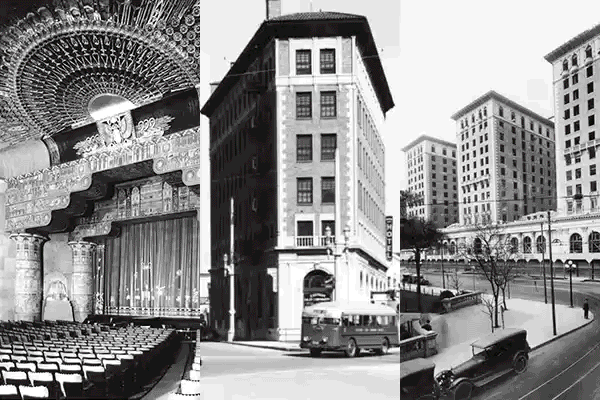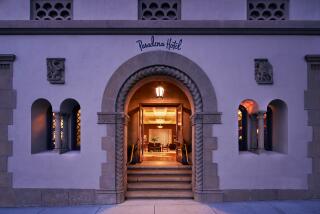Writing at the Willard
- Share via
Like others before me I was inspired to put pen to paper during a stay at the Willard Inter-Continental in Washington, D.C.
I scribbled a letter to congratulate a friend on a promotion. I dashed off a post card to mark a birthday. I jotted a few diary notes. And I felt guilty.
Others before me at the Willard had written more and better.
There was Julia Ward Howe of Boston, a guest with her surgeonhusband in 1861. She was awakened one morning by the sound of soldiers marching by and singing “John Brown’s Body,” a popular tune that was becoming an anthem for Union troops.
Howe felt the words lacked dignity. She left her bed, went to the desk and, on Willard stationery, wrote “The Battle Hymn of the Republic.”
Coverage of the War
There was Nathaniel Hawthorne, who hung out at the Willard while covering the Civil War for Atlantic Monthly magazine. There were Charles Dickens, Mark Twain and Walt Whitman.
A hostelry of some sort has been on the Pennsylvania Avenue site since 1816. But it was 1850 before the Willard brothers bought the property, just a block from the White House, and combined six row houses into a 100-room hotel.
The present structure, a lavish beauty of French imperial beaux-arts style, was finished in 1904. Its architect--Henry Janeway Hardenbergh--also designed the Plaza Hotel and the Dakota apartments, both facing New York’s Central Park.
Times grew tough following World War II, however, and the Willard family sold the property. In 1968 the once-proud building was boarded up.
The next Willard headlines came almost two decades later with its meticulous restoration and grand reopening. Now, travelers and politicians once again enjoy the glittering lobby--its ceiling studded with state seals--and the mirrored, block-long corridor called Peacock Alley.
Historians recall that President-elect Abraham Lincoln held staff meetings in front of the lobby fireplace while staying at the Willard for 10 days before his inauguration in 1861.
Lincoln and his family arrived in the capital by private railroad car and slipped into the hotel before dawn as a security precaution. Assassination rumors were flying even then. “I am surely glad to be under your roof,” Lincoln wrote in a letter to the Willards.
Lincoln paid the hotel bill--$773.75--with his first presidential paycheck. And that was when rooms cost about $4 a night.
It was also in the Willard lobby that President Ulysses S. Grant escaped the Oval Office to relax with a brandy and a cigar. So many power brokers approached him on individual matters that he dubbed these people “lobbyists.”
It was the price of cigars at the Willard newsstand that caused Woodrow Wilson’s vice president, Thomas Marshall, to complain: “What this country needs is a good 5-cent cigar.”
Celebrity Interviews
Reporters have long known the Willard, gathering to interview celebrities as diverse as Samuel Morse, Harry Houdini, the Duke of Windsor and Gypsy Rose Lee.
Today the Round Robin bar, overlooking the corner of Pennsylvania and 14th Street, is again a cozy nook where, on a summer’s evening, you can sip a cooler alongside Cabinet members, congressional aides and an occasional senator.
This is where the Great Compromiser--Sen. Henry Clay of Kentucky--is said to have mixed the first mint julep in Washington.
Recently I had lunch in the elegant Willard Room with two National Geographic researchers who brought sheafs of paper to the table. We took notes and traded ideas. We laughed and shared quotes and queries.
Discreet waiters served us crisp salads and grilled swordfish with a piquant sauce. They did not seem bothered by the yellow pads that flanked our plates, nor the books stacked deftly on the floor. They even found room for creme brulee, and so did we.
In Washington that seems to be business as usual; dining and decisions are linked. At the Willard there’s the heady sense that some part of what is said or written just might make a footnote to history.
More to Read
Sign up for Essential California
The most important California stories and recommendations in your inbox every morning.
You may occasionally receive promotional content from the Los Angeles Times.










